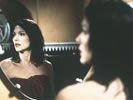Eye For Film >> Movies >> Mulholland Drive (2001) Blu-Ray Review
Mulholland Drive
Reviewed by: Jennie Kermode
Read Angus Wolfe Murray's film review of Mulholland Drive
With David Lynch's work attracting a flood of fresh attention thanks to the revival of Twin Peaks, it's a great time to revisit one of his finest works to date, Mulholland Drive (which was, at one point, intended to be a Twin Peaks spin-off miniseries featuring Audrey Horne). This beautifully restored Blu-ray edition comes with an extensive set of extras that will thrill fans and will also, like the best of Lynch's work, leave them with a great many interesting new questions and prompts for research.
Some of this is overtly focused on critical theory, some more accessible to the casual viewer (if such a thing exists in Lynch's case). The first feature entails a lengthy explanation of what has come to be the majority critical intepretation of the film - in other words, a guide to the plot for those who found it too confusing to untangle. Others go into greater about the symbolism and the references used in the film, including discussion of Lynch's passion for the works of Ingmar Bergman. Lynch himself pops up intermmittently in these discussions, concurring with some things and complicating others. He also has interesting things to say about sound design and about music, the latter rounded out in an interview with Angelo Badalamenti which explores their collaboration, the composer's working process and the way Lynch persuaded him to take a small acting role in the film.

Ample reference is made here to Lynch's other works. Impressively, with the exception of references to the feature presentation, it's pretty much spoiler free, so if this is your first encounter with the director's work you will be able to enjoy these features straight away. You're likely to get a lot more out of them if you've seen his other films, however, and more still if you have a good understanding of cinema history and art history more generally.
On the lighter side of things, there are the interviews. some of the material in the EPKs is repeated elsewhere, as is standard with these things, but the different contexts will prompt you to find fresh interpretations of what's being said. Laura Harring is charmingly enthusiastic and talks a lot about how the director engages with actors. Justin Theroux clearly relates to the film's cynical depictions of Hollywood studio culture. Naomi Watts swears a lot and expounds on her various errors, but Lynch looks at her as if he knew from the outset he'd struck gold.
The whole is a fascinating meditation on one of the world's greatest living directors and a film that has more to offer every time one watches it.
Reviewed on: 24 May 2017
















